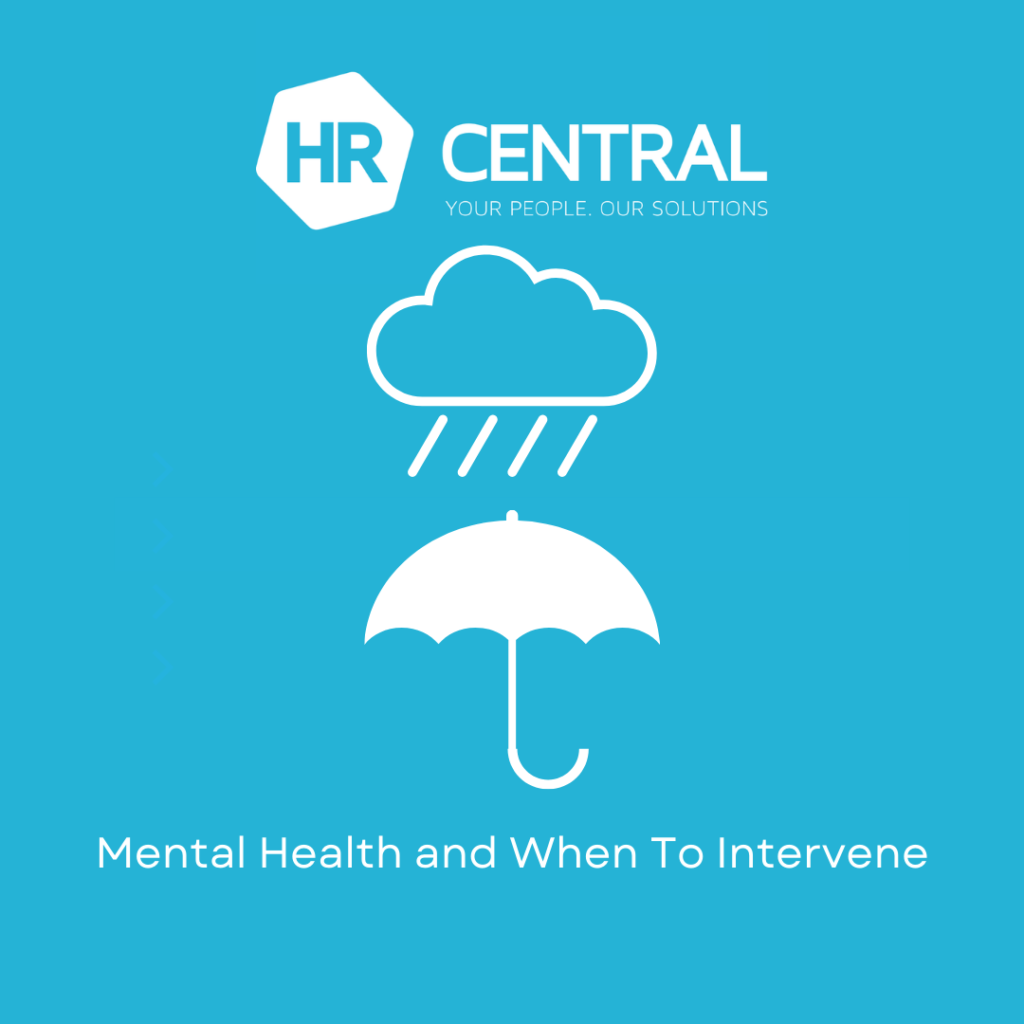Employee Mental Health
As an employer it is probable that you will manage/or even already have managed an employee that is impacted by mental health. Mental health issues significantly increased during the pandemic and research says that at least one in five people will experience a mental health issue every year. As an employer it is important to check in with your employees, to take the matter seriously and provide resources and support for the safety and wellbeing of your team.

There is a clear correlation between poor mental health and productivity at work, especially when it comes to an employee’s ability to do their job when suffering anxiety or depression. As an employer/manager trying to handle these issues, it can impact your own health and wellbeing as well, and negatively impact others. If left unmanaged, it can have knock on effects such as missed deadlines and work goals, or contribute to a poor workplace culture where staff may be overloaded from picking up work not completed. It can even result in poor service that can have the potential to create unhappy clients or customers of your business.
The COVID 19 pandemic has generated so much change in the workplace over the last 2 to 3 years. Concerns for job and income insecurity, changes to how work is delivered and performed (for example working from home and meetings via video), and changes in tasks and duties due to staff shortages/isolation due to symptoms or positive testing. It is not surprising that The Black Dog Institute estimates that employee mental health is costing Australian business approximately 39 billion dollars each year and The Australian Productivity Commission estimates poor mental health costs the Australian economy actually closer to a whopping 200 billion dollars per year.
For these reasons, health and safety regulators across Australia are focussing on employer responsibilities for mental health in the workplace, and made a commitment in May 2021 to implement regulations designed to identify and address risks for employee mental health. In Victoria, new regulations were introduced in July 2022 about managing psychosocial hazards in the workplace. It is expected all other states and territories across Australia will follow suit.
Psychosocial hazards are defined to mean any factor or factors in:
- The work design
- The systems of work
- The management of work
- The carrying out of that work
- Personal and work related interactions
And if they arise in the workplace they may cause an employee to have a negative psychological response that poses a risk to their health and safety.
Examples include sexual harassment, aggression, violence and exposure to traumatic events. It can also include high/low job demands, low job control, poor support, lack of job clarity, poor environmental conditions, remote/isolated work, poor change management, lack of reward and recognition and poor working relationships.
So apart from making good business sense in managing issues as they arise, employers will need to ensure they comply with work health and safety legislation in regards to employee mental health.
What does the evidence tell us?
It seems clear that as an employer you need to take those steps to intervene when it comes to employee mental health both on an individual case level and across your organisation in a proactive manner.
For promoting positive employee mental health in your workplace you should welcome discussion with your employees about what they think might need improving. Ask your team what are the main issues that cause them to feel their mental health at work is at risk. You can do so by inviting individual or group discussions, or you can conduct anonymous employee surveys, as ways to collect honest feedback. Giving a voice to your employees through various channels shows a commitment that you value your employees, and have their interests at heart.
Thankfully many ideas you can put in place to improve and manage employee mental health does not have to cost a fortune to your business. But it does need to be meaningful. Giving your employee’s access to readily available mental health resources through organisations such as Beyond Blue or The Black Dog Institute or other similar organisations is one affordable option. Often these organisations will either hold no or low cost webinars where staff can hear about how to look after their mental health. They also have resources for leaders and employers . Holding a webinar over a lunch break for your employees with an optional invitation keeps the door open for meaningful conversations and information sharing.
It is also invaluable to equip your team with education and understanding on how to look after each other. By doing so, it can promote a close and positive culture that can increase productivity and can enhance the attraction (and retention) of great talent. Promotion of R U OK? day and references or apps that provide similar resources to employees is also key for a business to encourage their employees to feel confident in looking out for each other, helping vulnerable employees feel safe and cared for.
Policies around code of conduct, and behaviours in the workplace, are invaluable in sending clear messages to your team around what your business will not tolerate and can encourage and remind employees about the affects that inappropriate behaviour can have on another person. For a worthwhile fee, group training on issues such as harassment, discrimination and bullying can also be an excellent method of clearly outlining examples of negative behaviours, how to recognise them, and what to do as an employee/employer should these behaviours occur.
Depending on the nature of the industry your company sits in, having breaks from the work to focus on mental health can also add value. For example you might plan to hold a meeting in the fresh air on a regular basis or to take your team on a walk. Putting on lunch occasionally and letting staff take an extended lunch break to attend that lunch can improve relationships. Some businesses also consider offering gym memberships, yoga or Pilates classes, meditation areas and access to healthy food options as other ways to promote wellbeing. Simple actions that can deliver impactful results!
HR Central understand that as an employer/manager this may not be something that you may be particularly experienced or confident with and as a result we can assist you if you need guidance. We can provide strategy for managing specific employee mental health issues and provide you with external psychological support sources such as Employee Assistance Program Providers. We can also provide relevant policies and training. We encourage every business owner to have plans and resources in place as a duty of care.
Managing mental health is good for everybody’s business.
Get in touch with our team to find out more https://hrcentral.com.au/contact-hrcentral/
